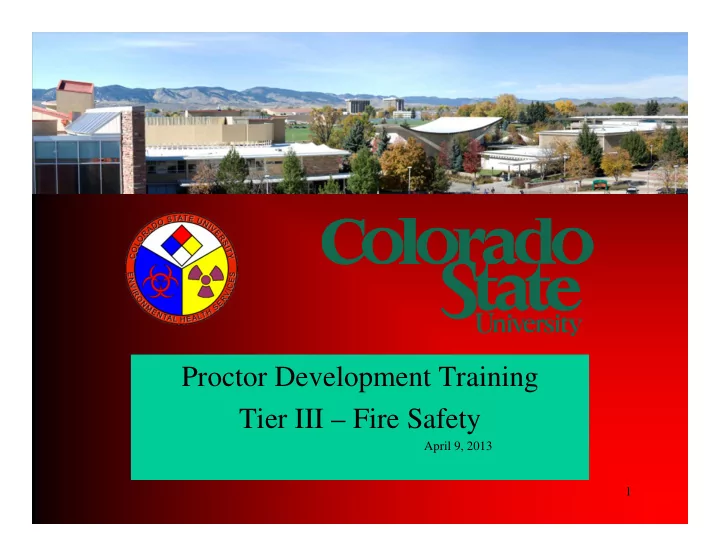

Proctor Development Training Tier III – Fire Safety April 9, 2013 1
Fire Safety Ken Quintana Environmental Health Services Ken.Quintana@ColoState.Edu 141A GSB 491-4749 567-6589 2
Topics • Emergency Response to CSU • Types of Fires • Types of Fire Extinguishers • Be Prepared Before an Emergency • AED’s on Campus • Question and Answer 3
Emergency Response to CSU • All 911 calls to University Dispatch and then to City Dispatch (cell phones) • Call 911 FIRST before trying to fight a CSU fire • PFA response time 2 – 4 minutes • PFA “in charge” once on scene • EHS Emergency Responders 4
Classification of Fires • Class A (Ordinary Combustible Materials) • Class B (Flammable Liquids) • Class C (Electrical) • Class D (Combustible Metals) 5
Class A • Ordinary combustibles or fibrous material, such as wood, paper, cloth, rubber and some plastics. Class “A” fires usually go to “A”shes 6
Class B • Flammable or combustible liquids such as gasoline, kerosene, paints, and chemicals. Class “B” fires usually are found in “B”arrels or “B”uckets 7
Class C • Energized electrical equipment, such as appliances, switches, panel boxes, and power tools. Class “C” fires have electrical “C”ircuits or “C”urrent 8
Class D • Certain combustible metals, such as Magnesium, titanium, potassium and sodium. • Class “D” fires usually have “D”… (maybe for “don’t add water!”) http://youtu.be/ODf_sPexS2Q 9
Types of Fire Extinguishers • Dry Chemical - ABC • Carbon Dioxide (CO 2 ) -BC • Combustible Metals 10
Check the Fire Extinguishers • Fire Extinguishers are inspected yearly • Check the dial to ensure it is in the “green” 11
12
13 Make a PASS • Squeeze • Sweep • Aim • Pull
14 It can happen to anyone!!
Be Prepared Before an Emergency • Know two ways out of an area or building • Know where the fire extinguishers, AEDs, and telephones are located • Never fight a fire when…… 15
Never Fight a Fire When… • T he fire is spreading beyond the spot where it started • You can’t face the fire and have your back facing an escape route • The fire can block your only way out • You do not have adequate fire fighting experience 16
Review Time • What are the first two rules of being prepared? • You should always fight a fire when it’s getting out of control. True? False? • Your back should be toward the door whenever you are forced to fight a fire. True? False? 17
Other EHS Programs • Automated External Defibrillator (AED) –www.ehs.colostate.edu 18
19 Question and Answer
Recommend
More recommend